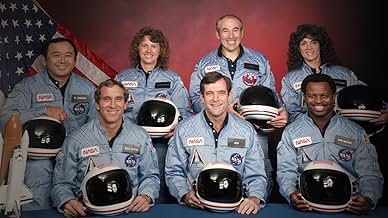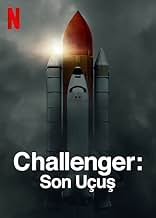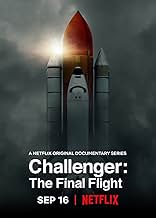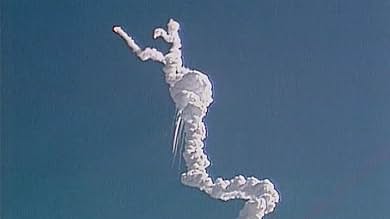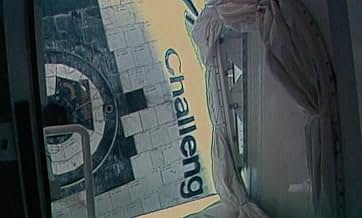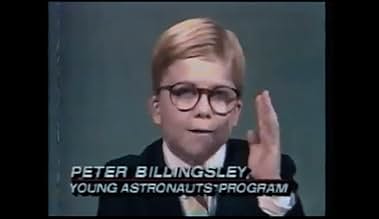CALIFICACIÓN DE IMDb
7.8/10
8.4 k
TU CALIFICACIÓN
Documental de cuatro partes sobre el desastre del transbordador espacial Challenger en 1986, que revela un momento imborrable para una generación de estadounidenses.Documental de cuatro partes sobre el desastre del transbordador espacial Challenger en 1986, que revela un momento imborrable para una generación de estadounidenses.Documental de cuatro partes sobre el desastre del transbordador espacial Challenger en 1986, que revela un momento imborrable para una generación de estadounidenses.
- Premios
- 2 nominaciones en total
Explorar episodios
Opiniones destacadas
Many born in the 90's have no recollection of a time when space exploration failed. This documentary looks at the successes of NASA in terms of inclusion during the 1970's and 80's. Then looked at how NASA got greedy and tried to do too many things at once, 7 great people were sacrificed in this greediness in January of 1986.
I have spent much of my adult life avoiding thinking about this tragedy. It is a case study on how an organization can become wicked and its members essentially the epitome of evil.
For me it was just horribly sad to watch this and there is a prevalent sense of horror as events move toward the inevitable ending.
What made it worth watching for me was to learn about Feynman's role. I knew the outline of it but not the specifics. It's quite amazing.
What astonishes me is there are these awful, old, gross NASA administrators who are still totally unrepentant, although they are clearly and obviously to blame for what happened.
For me it was just horribly sad to watch this and there is a prevalent sense of horror as events move toward the inevitable ending.
What made it worth watching for me was to learn about Feynman's role. I knew the outline of it but not the specifics. It's quite amazing.
What astonishes me is there are these awful, old, gross NASA administrators who are still totally unrepentant, although they are clearly and obviously to blame for what happened.
I found it interesting that the name "Roger Boisjoly" wasn't mentioned once. The man who probably fought harder than anyone to fix the o-ring problem gets passed by?
While the series held my interest for all four episodes, a little more tech and a little less teacher would have been better, for me at least.
I've seen every documentary on space and the Challenger that have been produced. Many were bad, some were good. This four part series is pretty good, covering familiar ground and likely a good refresher for anyone who lived through those times, or more beneficially for those younger people who are just raising their awareness and understanding of this troubling catastrophe.
The producers did use the "it's going to blow up" scenario as the dramatic leverage (e.g. cliffhanger) here. I think its overuse is justifiable, though, given the fact that if the NASA decision makers had listened to the whistleblowers and weighed the risks, the crew would have been pulled off Challenger until corrective design changes could be made (or at the very least, until a launch attempt in February when temperatures were above freezing could be attained).
One remarkable thing to note: Americans were proud of our accomplishments then, and the early footage of the shuttle launches proves it with various video segments showing people actually waving flags and saying how proud they were of their country. It is sad to think that that very footage seems so alien now, given how bad many citizens of America love to trash their own country.
The producers did use the "it's going to blow up" scenario as the dramatic leverage (e.g. cliffhanger) here. I think its overuse is justifiable, though, given the fact that if the NASA decision makers had listened to the whistleblowers and weighed the risks, the crew would have been pulled off Challenger until corrective design changes could be made (or at the very least, until a launch attempt in February when temperatures were above freezing could be attained).
One remarkable thing to note: Americans were proud of our accomplishments then, and the early footage of the shuttle launches proves it with various video segments showing people actually waving flags and saying how proud they were of their country. It is sad to think that that very footage seems so alien now, given how bad many citizens of America love to trash their own country.
Full disclosure: I am a space enthusiast. I would have loved to go to space. And I vehemently support the US manned space program.
However... I have lived through all three major US space catastrophes, where we managed to kill (as of today) 17 astronauts in spacecraft (albeit three of those on the ground), and the sad truth about each of those tragedies is that they occurred because of people who put "schedules" and/or "money", ahead of crew safety. My "impression" is that, at the moment, we seem as though we might be over that hurdle (in our space program), but if for no other reason, this four-part documentary should serve as a cautionary tale, as it clearly shows how seemingly intelligent people, can make extremely dumb (or selfish) decisions, with total disregard for human life. It also clearly shows how, when incidents like these occur, you absolutely need to bring in a bevy of _independent_ outsiders to oversee the inevitable investigations that follow, because the guilty parties (be they individuals, or corporations) will go out of their way to try to gloss over their culpability, in having caused failures on this scale.
The focus of this documentary is different than a lot a previous efforts that cover this tragedy. It does go into a lot of detail about the root cause of the accident, how it was already a known (and very concerning) problem, and how/why managers within the contractor (Morton Thiokol) and NASA ranks choose to rationalize away the risks, simply to try to keep the shuttle program "on schedule". But this documentary spends just as much time talking about the seven people who lost their lives, and numerous family members and friends of the astronauts participated in new interviews, to give a more thorough understanding of who these people were, and what their lives were before the tragedy, and could have been, had their lives not ended so unnecessarily.
Also, there are interviews with people who risked the livelihoods to come forward during the Rogers Commission investigation, to provide information that no one else was providing, which clearly detailed the root cause of the accident, and the culpability of the people who decided to ignore the warnings of "impending doom". And, as with the family members, there are also new interviews (somewhat surprisingly) with the key (living) Thiokol and NASA employees who participated in the (flawed) recommendation to launch Challenger, even though their own engineers were vehemently opposed to doing so.
Anyway, this is an important slice of US Space Program history, and the series gives a solid understanding of how/why this tragedy occurred, as well as an "up close and personal" look at the people involved. I highly recommend it.
However... I have lived through all three major US space catastrophes, where we managed to kill (as of today) 17 astronauts in spacecraft (albeit three of those on the ground), and the sad truth about each of those tragedies is that they occurred because of people who put "schedules" and/or "money", ahead of crew safety. My "impression" is that, at the moment, we seem as though we might be over that hurdle (in our space program), but if for no other reason, this four-part documentary should serve as a cautionary tale, as it clearly shows how seemingly intelligent people, can make extremely dumb (or selfish) decisions, with total disregard for human life. It also clearly shows how, when incidents like these occur, you absolutely need to bring in a bevy of _independent_ outsiders to oversee the inevitable investigations that follow, because the guilty parties (be they individuals, or corporations) will go out of their way to try to gloss over their culpability, in having caused failures on this scale.
The focus of this documentary is different than a lot a previous efforts that cover this tragedy. It does go into a lot of detail about the root cause of the accident, how it was already a known (and very concerning) problem, and how/why managers within the contractor (Morton Thiokol) and NASA ranks choose to rationalize away the risks, simply to try to keep the shuttle program "on schedule". But this documentary spends just as much time talking about the seven people who lost their lives, and numerous family members and friends of the astronauts participated in new interviews, to give a more thorough understanding of who these people were, and what their lives were before the tragedy, and could have been, had their lives not ended so unnecessarily.
Also, there are interviews with people who risked the livelihoods to come forward during the Rogers Commission investigation, to provide information that no one else was providing, which clearly detailed the root cause of the accident, and the culpability of the people who decided to ignore the warnings of "impending doom". And, as with the family members, there are also new interviews (somewhat surprisingly) with the key (living) Thiokol and NASA employees who participated in the (flawed) recommendation to launch Challenger, even though their own engineers were vehemently opposed to doing so.
Anyway, this is an important slice of US Space Program history, and the series gives a solid understanding of how/why this tragedy occurred, as well as an "up close and personal" look at the people involved. I highly recommend it.
¿Sabías que…?
- TriviaWhile the Challenger crew were the first to die during a mission, they were not the first NASA crew to be killed. The three-man crew of Apollo 204 (aka, Apollo 1), Gus Grissom, Roger B. Chaffee and Edward H. White II were killed in a fire in their capsule during a launch practice run on the launch pad on January 27, 1967. The docuseries makes no mention of this earlier fatality (what the NASA engineer said was that no NASA astronaut had been "killed on their way to space" to fit the narrative of the Challenger deaths, so it was a matter of semantics).
Selecciones populares
Inicia sesión para calificar y agrega a la lista de videos para obtener recomendaciones personalizadas
- How many seasons does Challenger: The Final Flight have?Con tecnología de Alexa
Detalles
- Tiempo de ejecución45 minutos
- Color
- Mezcla de sonido
Contribuir a esta página
Sugiere una edición o agrega el contenido que falta

Principales brechas de datos
By what name was Challenger: The Final Flight (2020) officially released in India in English?
Responda


